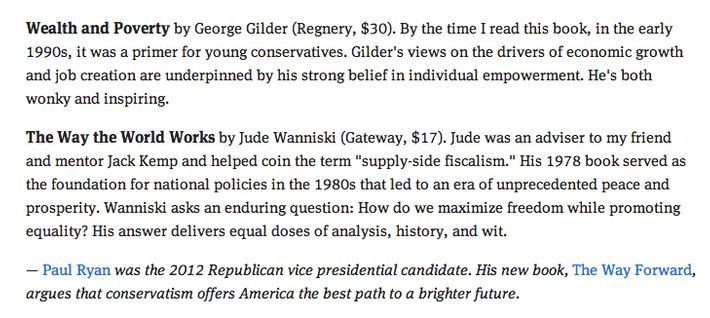
Paul Ryan was asked by the Week to list his six favorite books about economics and democracy. The request was a bit mischievous, as Ryan has tried (since his ascension from backbencher to his current role as chief ideologist of the Republican party) to downplay his love of Ayn Rand and her magnum opus, Atlas Shrugged. And now, the volume that Ryan once handed out to all his staffers, listed as one of his three most frequently reread books of any kind and cited as the entire reason he got into public service, no longer makes the top six list of books on politics and economics. (Follow-up question for Representative Ryan: Are there any books that you considered, sir, but that did not make the list?)
More interesting — and revealing of the direction Ryan is headed — are the final two books Ryan does name: The Way the World Works by Jude Wanniski and Wealth and Poverty by George Gilder. I have read both. Wealth and Poverty is a weird, rambly, mostly unoriginal recitation of free-market homilies whose influence largely derives from the fact that it came out just as Ronald Reagan swept to power and was thus seen as an intellectual manifesto for the new Republican Party. The Way the World Works is a novel argument that the entire history of the world can be explained by changes of tax rates. The fall of the Roman Empire, the rise of the Nazis — Wanniski attempts to explain it all as a result of taxes. It is a work of genuine derangement on the same intellectual level as the sorts of unpublishable hand-scrawled diatribes that I used to scan through when I sorted the mail as a magazine intern.

The lunacy of Wanniski’s worldview was often hidden by the fact that his main theory centered on a technical issue area that most people don’t understand, and he had a powerful patron in Jack Kemp, whom he had converted to the supply-side cause and continued to tutor throughout his career. Eventually Wanniski started defending the likes of Louis Farrakhan and Slobodan Milosevic, denying Saddam Hussein had gassed the Kurds, and so on, which made his oddity more obvious to the lay audience. Gilder is actually even less hinged than Wanniski, and has held forth on various views from a belief that ESP is real to insisting “there is no such thing a reasonably intelligent feminist.”
So it seems the lesson Ryan has drawn from the harmful publicity surrounding his Rand fixation is not that he shouldn’t associate himself publicly with crackpot authors but merely that he should find different crackpot authors. And of course there are crucial differences. Rand loved the rich, or at least the deserving capitalist rich, and despised the poor. Gilder and (especially) Wanniski loved the rich as well, but had none of Rand’s bile. They believed that cutting taxes for the rich held the key to all human progress, that a world in which the heroes of capitalism could exert their imagination and drive free of the burden of slightly higher taxes was a world in which everything was possible, that the poor would be uplifted. Wanniski’s central message was that Republicans did not need to cut spending in order to cut taxes for the rich — that cutting taxes would actually furnish more revenue.
This was the persona that defined Ryan before the Obama years. He was an advocate of wildly profligate schemes to cut taxes and hand out private Social Security accounts, which even the Bush administration deemed fiscally irresponsible. Having discovered that zero-sum fiscal math leaves him in the position of defending tax cuts for a tiny minority of the population while imposing severe pain on a much larger group, he is starting to edge toward the old, Ryan-style mix of tax cuts for the rich without identifying offsetting cuts. The old (and actually still existing) Ryan budget relies on massive cuts to benefits for 47 percent to make the ledger add up. Ryan’s most recently unveiled poverty plan would hold the budget constant, without explaining where he would find the money to make up the difference. The new Ryan looks like the Bush-era version, with lots of giving to the rich without all the taking from the poor. Ryan recently reaffirmed that cutting marginal tax rates is the key to prosperity: “I believe that the best way to help families, the best way to help the economy is to reduce rates across the board,” he told John McCormack, “Growth occurs on the margin, which is a wonky way of saying, if you want faster economic growth, more upward mobility, and faster job creation, lower tax rates across the board is the key — it’s the secret sauce.” Meet the new sauce, same as the old sauce.






























